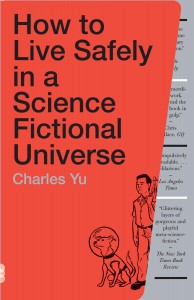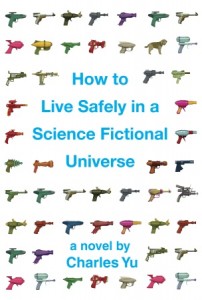February 28, 2012
The Vicious Circle reads How to Live Safely in a Science Fictional Universe
Last Sunday, the Vicious Circle met again for brunch, every one of us in attendance. We wouldn’t say we got right down to it because Charles Yu’s How to Live Safely in a Science Fictional Universe was a strange old book, not quite our thing. So we kept putting it off, because we had to talk about Mad Men, gossip, other books and ghastly things we’d read on Twitter. And then finally we started, the conversation began, and it flowed, and flowed, one of the most insightful book club discussions we’ve ever achieved. (Or maybe it just looks that way because the secretary among us took down some really extensive notes.)
We began with the central idea of the book, of the main character being stuck in a loop and how we could recognize that. That even before the part of the book where the character is both writing and reading his story at once, we had a sense of projecting ourselves and our experiences onto the story. (Which is perhaps the way that most of us read stories.) We talked about the books perceived depth versus its actual depth, and how it tricks you into thinking that there is a technical complexity to it but the complexity is emotional. This is shown when the father reveals his theory of time travel, which turns out not to be accomplishable by technology at all but by intellectual force instead, by the power of the mind. But that time travel was also a physical voyage– you don’t just appear in another place, but you have to get there. Which is sort of the way of everything.
Some of us loved TAMMY, the operating system of the main character’s time machine. But others of us were disappointed– TAMMY lacked emotional depth, one of us said. “She’s a computer program,” said another. “That’s not the point,” was the rebuttal, and that was rebutted with, “Yes, it is!” Some of us who’d read Hitchhikers Guide to the Galaxywere disappointed by elements of the book such as TAMMY, which seemed to have been done better many times before. Perhaps it’s a homage though, one of us suggested. That its connection to other works was quite deliberate. (Two of us didn’t finish the book. We just couldn’t see the point.)
We loved the twist of “science fiction” being substituted for physics here as the laws of which the universe must obey, and how the laws of science fiction opens up the possibilities for so many things. We found the mother’s story compelling, stuck in a sixty minute loop and her son feels guilty because he didn’t spring for an hour and a half. We thought this book reminded us of The Raw Shark Texts in terms of how it treats loss, creates its own universe, and considers the book as object.
We had trouble situating the book in time, kept stumbling over logic problems– how long as the main character been away from his life? It’s tricky to figure out, this universe corresponding to the laws of science fiction after all, which are hard to gets one’s head around. And then we starting thinking about movies the book reminded us of– “Moon” by Duncan Jones, “Another World”. Also the book Among Others by Jo Walton, for its employment of fantastical elements. We remark that this isn’t a book that exists in a vacuum. But does this compromise its literary quality, we wonder? There is a shallowless to it, but no. It’s actually highly literary on a mechanical level, and we note how much of the novel is about how books and novels are put together, the nature of existence in the science fiction universe is determined by tenses. And though the book seems shallow upon first reading and requires skimming to get through, we note that the book itself is a loop and that meaning becomes deeper upon subsequent readings.
And it is literary– we remark upon the good writing, the emotional resonance of the scene with his father. And that the writer exercises a great deal of restraint in order to feed the loop structure– the nature of a loop is shallowness. That TAMMY stands for the fact that so many people spend their entire lives contemplating narratives that don’t really exist. That TAMMY is his projection of self. And we end on this note: TAMMY is Google, and everything it is we’ve ever fed to it.
Then we go back to the buffet for seconds.








Perfect wrap up, Kerry. It’s odd that I went into this meeting liking the book, and came out finding myself less in love with it. Perhaps I felt I had to play the part of naysayer. 🙂
Nicely done. Thanks to your excellent posts, I feel like I get to experience all the best bits of our meetings twice over! Such lovely people & such satisfying book talk.
Just found this post. This is my favorite book (and I’ve read a lot of books), for all the reasons you describe (poetic language, use of “science fiction” as a self-aware setting, the meta-ness about it).